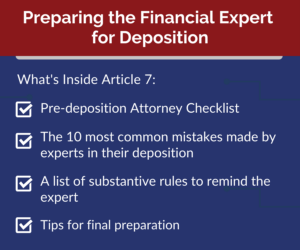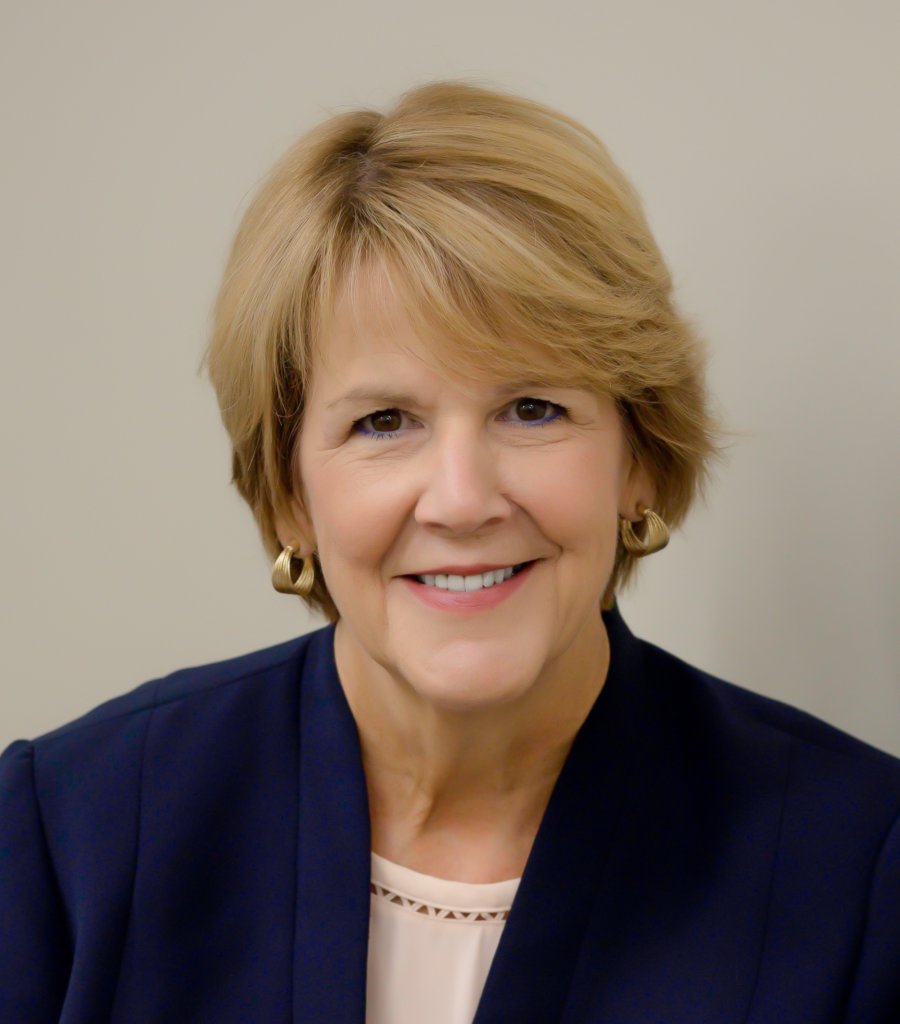
Article 7: Preparing the Financial Expert for Deposition
Welcome back to our series on working with a financial expert in business litigation. If you missed the last article that explored what an expert does when a business has ended due to the alleged wrongful activity, you can read it here. This time, we are looking at ways you can help the financial expert prepare for providing testimony in their deposition.
The deposition is a critical piece of discovery and it is important for the expert to work with counsel to prepare for this. This preparation takes time and should not be left until the last minute. Ideally, the preparation would begin a few weeks before the deposition and be split over the course of several days. This provides both the witness and counsel the necessary time to check up on newly discovered information, obtain additional documents as needed, and recollect the events and key issues relating to the case.

Attorney Preparation Before Deposition
Once the expert has completed their report it is well worth the time for counsel to read and become familiar with the report. Have the financial expert assist you in doing this, and lean on the financial expert to become thoroughly familiar with both your expert’s report and the opposing expert’s report.
Many attorneys have liberal arts undergraduate degrees (e.g. political science, history, communications, psychology or sociology), while most financial experts have received some form of a business degree (e.g. accounting, finance, economics, MBA). Sharing and understanding these unique skill sets allows the two groups to work together more effectively.
It’s extremely helpful if, prior to working with the financial expert to prepare for deposition, you review the following:
● the pleadings
● both your strategy and the opponent’s strategy
● the law (this is an area the financial expert typically knows little to nothing about)
● all discovery
Expert Preparation Before Deposition
Before getting into specific suggestions for ways to prepare the financial expert for deposition it is both interesting and informative to review the 10 most common mistakes made by experts in their deposition:
- 1. Poor listening skills
2. Interrupting the questioner
3. Guessing or speculating
4. Inability to say “I don’t know”
5. Joking as part of their response
6. Subpoena non-compliance
7. Baited into losing their temper or being angry
8. Using hedge words such as “it appears”, “might be”, “possibly”, “it seems to me”
9. Failing to use a period…..STOP TALKING
10. Volunteering information
To get started, counsel can ask the expert to discuss the various stages of the assignment and their retention as an expert. It can be useful to you as counsel to hear the expert’s responses before the deposition, as this can highlight areas of miscommunication or a need for sharing additional information. Start with asking what do they remember about each of these stages of work:
● Pre-engagement
● Engagement
● First meeting with counsel
● Communications with parties to the litigation
● Communications with counsel
● Preparation of report
Finally, along with the procedural rules all litigators are familiar with, there are a few helpful substantive rules worth sharing with the expert, including:
- ➢ Tell the truth.
- ➢ Listen to the question completely before answering –think mechanical, not conversational. Pause before answering each question as this provides time to think about the answer.
- ➢ Don’t volunteer information. Answer only the question being asked as less is better.
- ➢ Silent gaps are used on purpose—leave them be! Pregnant pauses are intended to make the witness volunteer additional information.
- ➢ Don’t guess—and don’t be afraid to say “I do not know” or “I do not recall” if it is a truthful answer. The expert is not required to remember every detail of the case.
- ➢ Leave all notes, binders, calendars, or other documents at the office, unless requested by subpoena to do otherwise.
- ➢ Focus on the Question: devote all energy to answering the question accurately and not worrying about why it was asked. Give every question your complete concentration and focused attention. There is no such thing as an unimportant, minor, or “throwaway” question. If distracted, say so and pause to collect your thoughts. Never answer without complete focus on the question.
- ➢ Ask for clarification or follow-up. If you realize an answer was wrong, ask to correct it. If an answer was not clear, clarify it immediately.
- ➢ Take your time. If asked about a specific document, take as much time as needed to review it to ensure you are familiar with it before answering.
- ➢ An independent expert is key. The expert is not an advocate; therefore, it is important that they don’t get tricked into answering “yes” to whether they are being paid to testify. Instead, an answer such as “I’m being paid to testify as to the facts of this case and my opinions, not to testify” is a better response.
Ultimately, the expert needs to master the facts of the case cold—including their analyses and report and be ready to speak to any of the exhibits or resources relied upon in reaching their opinion(s). In the past, experts were able to simply state conclusions as fact without supportable evidence to back up those conclusions; but, in today’s environment, the triers of fact expect experts to have support and logic as the basis for their assumptions that led to their conclusions, and rightly so.
Conclusion
Time spent between attorney and financial expert preparing for deposition can be invaluable. Running through sample questions and even having a mock deposition can be helpful in making the expert more comfortable and possibly assist in identifying key documents or information that counsel is aware of that hasn’t been shared with the expert.
The overall goal is for the expert to exude the three C’s when testifying: Credibility, Clarity, and Conviction. To do this, careful preparation is needed and, if done correctly takes time—don’t leave it to the last minute.
Coming up Next Time
Next time, we will consider how an attorney might prepare for the deposition of the opposing financial expert.
We’re Here to Help
Hiring the right financial expert can have a significant impact on your case. Based on our firm’s 45+ years of experience focused entirely on determining damages and valuing businesses, we can provide insight, experiences, and ideas for ways to approach the financial portion of your litigation project that you may not have encountered yet.
Stay tuned to your inbox and follow Capital Valuation Group on LinkedIn as we share more from this series on successfully working with financial experts through each phase of the litigation process. If you have a particular situation you would like to discuss, give us a call. We are happy to have a complimentary initial discussion.
Would you or other people in your firm find value in this series? Please share or they can subscribe to our email list here.

Cathy Durham is a principal of Capital Valuation Group, Inc., headquartered in Madison, WI. Capital Valuation Group has been helping business owners across the country understand, increase and unlock the value of their businesses for over 45 years through keynote speaking, valuation analysis, determining damages and providing expert witness testimony. Cathy welcomes conference and event speaking inquiries and can be reached at cdurham@capvalgroup.com. Phone 608-257-2757
